Edie Melson's Blog, page 211
February 1, 2020
It’s Writing Conference Season & Time to Practice Your Pitch
by Edie Melson @EdieMelson
Attending a writers conference can be a stressful undertaking—even for a seasoned writer. A lot of writers have gravitated toward our profession because we’re not comfortable with crowds, especially crowds of strangers.
That’s why I’m posting this series on writing conferences. It’s not to add to your stress—but to alleviate it. For me, when I know what to expect and am prepared, I’m less anxious. No one likes to feel like they’re under the gun. I assume I’m not alone in this feeling.
It’s Writing Conference Season & Time to Practice Your Pitch – @EdieMelson on @BRMCWC
So the first subject we’re going to tackle is the one that makes most writer’s stress levels spike off scale—pitching.
Over the years I’ve had people tell me they’re not worried about pitching—they’re just going to learn. Nice thought, but not always based in reality.
Let’s consider this scenario. You’re standing in line or sitting beside someone and they ask you what you’re writing. If you answer them, you’ve just delivered a type of pitch.
We don’t want to stress you out, but we do want you to be prepared for any appointments that God may have for you.
It’s important to keep in mind that everything you prepare for the conference to pitch a project is incremental in nature.
Your tag line or hook should make the editor or agent ask to hear more about your project (this is the time for the elevator pitch).
The elevator pitch should lead them to ask for your one sheet.
Your one sheet or pitch sheet should lead them to ask you to send them a proposal when you get home.
Your proposal should lead them to ask you to send them your entire manuscript.
Your entire manuscript should lead them to offer you a contract.
These are the generic steps in publishing. God can step in at any time in the process and something completely different can, and often does, happen. But, until that happens, I try to take it one step at a time.
tag line or hook – this is one sentence, preferably 15 words or less. It should NOT be a synopsis of your book, but rather it’s to intrigue the editor/agent and make them want to know more.
elevator pitch – this should be short, around 45 seconds. It will sound a lot like back cover copy or what is on your one sheet. Again, it’s to make the editor/agent ask to see more.
one sheet or pitch sheet – this gives the blurb about your book, information about yourself (bio) and general info, like genre and audience for your project. If it’s fiction, it states that the project is finished. If it’s non-fiction it gives a completion date if the project is unfinished.
So Back to the Pitch
The idea behind a pitch is to get the person you’re talking with to ask for more. It’s a simple concept, but harder to execute. So here are some of the do’s and don’ts of pitching.
Do
Set up an intriguing scenario.
Introduce your main character.
Give a hint about their situation and goal.
Tie in the disaster or obstacle to that goal.
Don’t
Go over two sentences—try to keep it to one sentence.
Answer all the questions the listener might have.
Substitute cleverness for specifics.
Give away the ending.
Now, here are some real life hooks or tag lines from popular movies. I’d love to read some of your favorites as well.
“She brought a small town to its feet and a huge corporation to its knees.” —Erin Brokovich
“To enter the mind of a killer she must challenge the mind of a madman.” —Silence of the Lambs
“What if someone you never met, someone you never saw, someone you never knew was the only someone for you?” —Sleepless in Seattle 1993
“A businessman falls in love with a hooker he hires to be his date for the weekend” —Pretty Woman
“When you can live forever, what do you live for?” —Twilight
“Just when you thought it was safe to go back in the water.” —Jaws 2
“In space, no one can hear you scream.” —Alien
Now it’s your turn to chime in. Do you have any questions or is anyone brave enough to try their pitch out here? We have a place for you to practice. We’ll be helping you hone your pitch in our Facebook Group – Blue Ridge Conference Writers.
DON’T share your pitch in a comment here. Instead go to our Facebook group and share it there!
I’ll get the ball rolling with the pitch I used for my science fiction novel, ALONE. (And yes, I sold this book because of pitching at a conference):
“A young woman has grown up expecting to die for her faith, but when her world is invaded by a race of giants, she has to decide if she’s willing to live for it.”
[image error]Edie Melson is a woman of faith with ink-stained fingers observing life through the lens of her camera. No matter whether she’s talking to writers, entrepreneurs, or readers, her first advice is always “Find your voice, live your story.” As an author, blogger, and speaker she’s encouraged and challenged audiences across the country and around the world. Her numerous books reflect her passion to help others develop the strength of their God-given gifts and apply them to their lives. Connect with her on her website, through Facebook, Twitter and Instagram.
The post It’s Writing Conference Season & Time to Practice Your Pitch appeared first on Blue Ridge Mountains Christian Writers Conference.
January 31, 2020
Infusing the Characters We Write With the Strength To Live Well
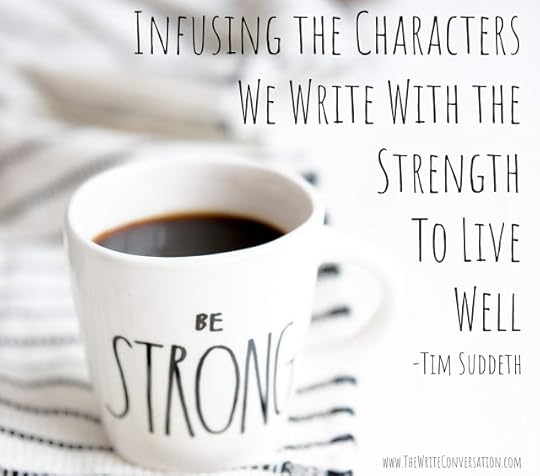
by Tim Suddeth @TimSuddeth
This weekend, I was fortunate to be able to celebrate two lives that were obviously well lived.
On Saturday, my family went to the visitation of the 93-year-old mother of a friend of mine. Her obituary, told how she had grown up during the depression, had a career working for various federal departments, and, upon her retirement at 62, took up competitive swimming and continued swimming throughout her eighties. (See this link for my take on obituaries.) Every time I met her, she had a big, beautiful smile and wanted to talk about my family and me.On Sunday, I carried my mother to our friend’s 90th birthday celebration. True to her nature, she didn’t want to have the party because, she said, “Who would come?”
Only most of the church and her extended family. Humble and gracious, she has touched a lot of lives without being flashy or outspoken, but by being present and caring.
Both of these ladies lived through many unhappy circumstances: a daughter who died as a small child, the lost of their spouses, and sickness. But they continue to have lives that give hope to those who knew them.
I want to show that in my life. I also want to show that in my characters’ lives.
The genre that I like most to read and write is mystery suspense. Not always a bright and cheery category. In fact, more and more I find books and authors who express darkness and the lack of hope or justice. Their characters face a life that is out of anyone’s control and, in the end, there is no reason to it. They have lives, but no hope or joy.
As a Christian, I know that isn’t true. There is a God who loves you and cares about you. Who has a plan and destination for each of us if we allow Him. Whatever circumstances we go through, He’s there. And He wants us to know Him. Personally.
In our craft books and classes, we often discuss the different types of conflicts: physical, mental, and emotional. But there’s another we discussed at Blue Ridge Mountain Christian Writers Conference and that is spiritual.
And yet it’s often the most important and the one we struggle with the greatest. Because if there is no God or He doesn’t care, like our feelings and circumstances can lead us to believe, then why bother?
And telling someone to buck up, lift your chin up, keep fighting, just rings hollow.
I’m reading another Eugene Peterson’s book, Eat This Book. See this link for last month’s comments on his Leap Over the Wall. I didn’t know he wrote anything but The Message. My bad.
He writes about how St. John in Revelation 10 is told by an angel to take a small scroll and eat it. “It will be bitter to your stomach, but sweet as honey in your mouth.”
I think a lot of times our sharing and witnessing give folks bellyaches, especially if they aren’t used to it. A baby has to start with baby food and applesauce before it can dine on pizzas and rib eyes. It’s the same for whoever isn’t used to hearing about the gospel or our Creator. We need to be careful that we don’t make them sick by giving them too big a portion.
We need to be careful that the hope and faith we share is giving in a way that is enticing and digestible to our reader or hearer. What good is sharing the gospel if we’re just chasing people away. It’s not a merit badge or some kind of pin. Right?
In our writing, how we do this differs with what we write. With devotions and Bible studies, you can be more direct. But what if you’re a journalist, write science fiction, or write for a secular market. What if you’re trying to start a blog and want to please your readers? What do you do then?
I know this, everyone of your readers needs hope. The hope that is only found in Jesus.
Sometimes telling this is scary and you may think for your writing whipping out John 3:16 isn’t appropriate.
Yet your reader still needs hope. Sometimes it’s me who needs to hear that there’s hope, that I’m loved.
So how can we do it? Because I don’t know of a more important message to give someone.
I just finished reading Lynnette Eason’s Code of Valor. (Told you I like mystery and suspense.) In it she shows (because we fiction writers don’t tell) the struggle that the main characters have in realizing that God gives a hoot for them and how they grow to realize He’s there.
Is it scary to write about something that we all experience but it makes us so vulnerable? Yes, and I’m sure it is for Lynnette, too. And she will probably get some negative reviews from that reader who can’t digest it yet.
She will also have readers who see themselves in her story and, just maybe, their problem will become a little less heavy. They will understand they don’t have to carry their burden, their yoke, all by themselves.
And if they were my readers, that would make me very happy.
TWEETABLE
Infusing the Characters We Write With the Strength To Live Well - @TimSuddeth on @EdieMelson (Click to Tweet)
 Tim Suddeth is a stay-at-home dad and butler for his wonderful, adult son with autism. He has written numerous blogs posts, short stories, and three novels waiting for publication. He is a frequent attendee at writers’ conferences, including the Blue Ridge Mountain Christian Writers Conference and a member of Word Weavers and ACFW. He lives near Greenville, SC where he shares a house with a bossy Shorky and three too-curious Persians. You can find him on Facebook, Twitter, or at timingreenville.com.
Tim Suddeth is a stay-at-home dad and butler for his wonderful, adult son with autism. He has written numerous blogs posts, short stories, and three novels waiting for publication. He is a frequent attendee at writers’ conferences, including the Blue Ridge Mountain Christian Writers Conference and a member of Word Weavers and ACFW. He lives near Greenville, SC where he shares a house with a bossy Shorky and three too-curious Persians. You can find him on Facebook, Twitter, or at timingreenville.com.
15 Things All Writers Should Say to Themselves
by Edie Melson @EdieMelson
Sometimes as writers we’re our own worst enemies. We nurture thoughts in our heads that we would never say out loud to someone else. Just like hearing something negative spoken over and over again can influence our self-worth, the things we think about ourselves can damage our ability to follow our calling.
15 Things All Writers Should Say to Themselves @EdieMelson on @BRMCW
While I titled this post things we should say to ourselves, we also must say them often enough that we actually come to accept and believe them.
15 Things Writers Should Say and Believe
I know my calling is valid. Pursuing my dream has purpose.
I accept that the biggest obstacle to my dream is my mind.
I cannot control what happens around me, but I can control how I respond.
I refuse to live in the past—past failure, past success, past missed opportunities. I will focus my energy on now and what’s to come.
I will fail. Failure isn’t permanent and it doesn’t define me or affect my value.
When I don’t have time for writing, I’ll re-evaluate my schedule and look for things I’m doing that God hasn’t called me to do.
I will refuse to play the comparison game. I’ll stop looking at other writers as competition and begin viewing them as teammates.
I will count my blessings and look for the good in even the most difficult circumstances.
I will reach out and help others achieve their dreams—looking for places and ways to encourage them.
I accept that I cannot pour out of a place that is empty. I will take time—daily—to fill myself up with God.
I will invest in being a better writer.
When things don’t turn out as I wish, I will believe that God has the best still ahead for me.
I will not expect to be the exception. I will work hard and be joyful when the unexpected happens.
I understand that looking on the bright side doesn’t mean ignoring the dark, it means bringing light into the dark.
First I will pray. Whatever the circumstances, this is where I’ll begin.
These fifteen things are foundational to finding joy and peace as a writer. In this new year, I pray each of you will embrace these truths and experience the fullness of writing for God!
[image error]Edie Melson is a woman of faith with ink-stained fingers observing life through the lens of her camera. No matter whether she’s talking to writers, entrepreneurs, or readers, her first advice is always “Find your voice, live your story.” As an author, blogger, and speaker she’s encouraged and challenged audiences across the country and around the world. Her numerous books reflect her passion to help others develop the strength of their God-given gifts and apply them to their lives. Connect with her on her website, through Facebook , Twitter and Instagram .
The post 15 Things All Writers Should Say to Themselves appeared first on Blue Ridge Mountains Christian Writers Conference.
January 30, 2020
Finding Time to Write: Choices All Writers Face
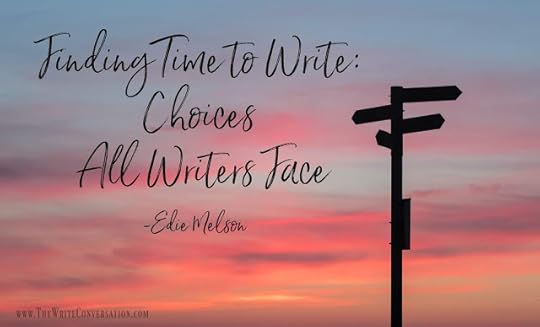
by Edie Melson @EdieMelson
True confession time.
Writing is both the thing I love best and the thing I hate most.
When the words flow, it’s heaven on earth. When they stutter to a halt, the opposite is true. And the truth is, both of these circumstances are a regular part of the writer’s life.
We write when we feel like, and when we don’t; when we’re inspired, and when we’re not. Most of all we write because we have to. Putting words on paper is life to some of us and an addiction without a recovery group.The time to write isn’t something we find. It’s something we sacrifice for, carving it out of lives that are as busy as anyone else. I get so weary of wanna-be writers complaining about no time to write.
I have author friends who don’t have the time either. One author I know honored a deadline even though his granddaughter was having brain surgery—he wrote in the hospital waiting room. Another, a stay-at-home mom, had just the opportunity of a contract and she wrote in the ten and fifteen minutes breaks available while caring for a special needs daughter, a preschooler and a toddler.
I could share story after story after story about how writers I know have sacrificed to follow their vocation—all true. The truth is that we all have the same 24 hours in a day and we all have the choice of how to spend them.
“If you can imagine yourself doing anything else besides writing—do it!”
I’ve been known to give this advice to those just starting out—because they still have time to turn back. I’m a hopeless case. I’ll write myself into a grave and hopefully beyond.
Becoming a writer is a decision—followed by a life of choices that enable us to live out that commitment.
Here are some of the hard choices you’ll need to make to find writing success:Trading TV time for writing time. (You’ll need those hours to put words on paper.)Committing to a lifetime of learning and staying current with the publishing industry. (The industry is changing a lightning speed, either keep up or die.)Saying no to the good things, so you’ll have time to say yes to the best things. (Writing is an isolated life a lot of the time.)A willingness to write through the junk to get to gems. (Good writing is rewriting—don’t let anyone tell you otherwise.)The necessity of checking your ego at the door. (There’s always someone more talented, successful, lucky, etc. Get over it and move on.)A willingness to trust other professionals (like your agent and your editor).An unwillingness to compromise what truly matters. (And no this does NOT contradict #6)Trading talking about writing for actually writing. (Networking is important, but not as important as writing)The commitment to keep going when the odds seem impossible. (In this industry impossible odds is the new normal.)Well, this is my list. It’s your turn to add your thoughts. You all always have such valuable insights, please share them below in the comments section.
Don't forget to join the conversation!Blessings,Edie
TWEETABLEFinding Time to Write: Choices All Writers Face - @EdieMelson (Click to Tweet)
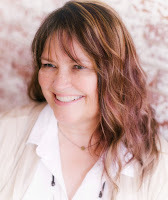 Edie Melson is a woman of faith with ink-stained fingers observing life through the lens of her camera. No matter whether she’s talking to writers, entrepreneurs, or readers, her first advice is always “Find your voice, live your story.” As an author, blogger, and speaker she’s encouraged and challenged audiences across the country and around the world. Her numerous books reflect her passion to help others develop the strength of their God-given gifts and apply them to their lives. Connect with her on her website, through Facebook, Twitter and Instagram.
Edie Melson is a woman of faith with ink-stained fingers observing life through the lens of her camera. No matter whether she’s talking to writers, entrepreneurs, or readers, her first advice is always “Find your voice, live your story.” As an author, blogger, and speaker she’s encouraged and challenged audiences across the country and around the world. Her numerous books reflect her passion to help others develop the strength of their God-given gifts and apply them to their lives. Connect with her on her website, through Facebook, Twitter and Instagram.
Capturing Your Ideas
by Heather Kreke @Hkreke
A writer is always working, whether you are sitting at a computer or not. If you’re anything like me, you usually get your best ideas at night. When you’re lying in bed. About five minutes before you fall asleep. Then you repeat the idea to yourself over and over, swearing you’ll remember it as you drift off. When morning arrives, the only thing you can remember is that you had a great idea, but don’t have clue what it was. If this is you don’t worry, there are ways to not forget.
Capturing Your Ideas @Hkreke on @BRMCWC
Your Phone:
Most of us keep our smartphone on or nearby us all the time. Get a good notes app and use it. Create folders: blog ideas, plot ideas, character ideas, research, or whatever it may be. Type your ideas in the app, it won’t take that long and trust me your phone has a much better memory than you do, especially right before bed. If you’re driving or don’t like to type use the text to speech feature. Record your ideas by speaking them out loud and your phone will translate them into text. Some apps can even be synced to your computer so that when you’re ready to work, all of your notes are right there.
Pen and paper:
If you don’t have a smartphone or just like the feeling of a pen in your hand, keep a notebook with you. It doesn’t have to be big or flashy, just something that when an idea hits, you can write it down. Write one idea per every two pages, that way you can add to it later.
Depending on how organized you are, you can keep one or multiple notebooks. Keep one in your car (pull over before writing something down), next to your bed, at your desk, in your pocket, or keep one for research and one for ideas. Just make sure when you sit down to write you have them all with you.
Whiteboard:
Those of you who get their best ideas in the shower are thinking but what about me. A notebook will get soggy and my phone and water don’t mix. Fear not! There are waterproof white boards, and even waterproof notebooks and pens out there. Get a holder and attach it to the wall in the shower, that way you can jot down notes as the ideas come to you
Tape Recorder:
Believe it or not tape recorders are still a thing, and Amazon has twenty pages of them. If you like to talk out your ideas but don’t have a smartphone, this could work for you. They are small and easy to carry, so you could take it anywhere. These would also be good for any interviews you are doing where you need to record for a long period of time.
There are a bunch of different ways to get your ideas into a form that will help you remember them. The important thing is finding something that works for you. You will probably end up using a combination of these things or trying something and not liking it. Keep trying things until you figure out what works.
How do you capture your ideas, wherever they come to you?
[image error]Heather is a novelist who is passionate about showing teens and young adults that they can trust God’s plan for their lives – even through the darkest times. She is published on numerous blogs and in the Christian Writers Market Guide. She also teaches a writing class at her church and completed coursework through the former Christian Writers Guild.
Heather is a mother of 3 redheaded girls and has been married to a redheaded husband since 2004.
The post Capturing Your Ideas appeared first on Blue Ridge Mountains Christian Writers Conference.
January 29, 2020
The Missing Piece
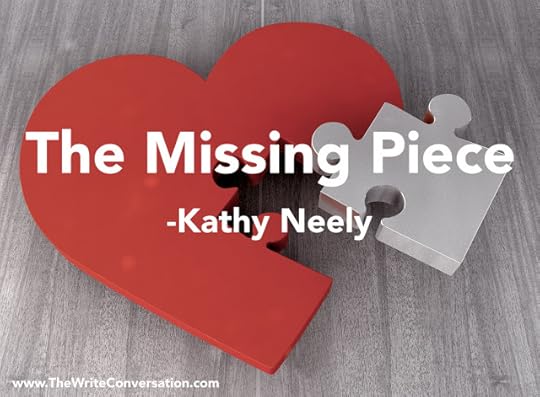
by Kathy Neely @NeelyKneely3628
Shel Silverstein is an icon in the world of children’s poetry. Where the Sidewalk Ends. The Giving Tree. Falling Up. I could go on and on. His simplistic illustrations, often in black and white, have become synonymous with his name.
He authored a book titled The Missing Piece. Here’s the quick premise. It looks like a cheese wheel with a wedge removed, or perhaps an open-mouthed Pac-man. It knows that something is missing, so proceeds to hunt for it.Every solution turns out wrong. It squeezes misshapen objects in an attempt to fill the emptiness. Too large. Too small. An incorrect form.
A myriad of lessons awaits us in this simple, yet complex children’s book. I’ve found myself trying to fill the emptiness with possessions, work, people, and even with writing. None of those things are bad, but they can’t fill the empty space. I’ve fooled myself with the ‘if only’ dream.
There’s only one perfect fit for the missing space in each of us. We were created to love and glorify God. Here’s the big problem. I think I do that, yet I still come up empty. If you continue reading Silverstein’s book, you’ll discover that It found a piece that fit, yet wasn’t satisfied. Why? Because the perfect circle caused it to spin past all the beloved parts of life. In the end, It chose to leave the space empty.
So, what’s our lesson? I believe that we can never fully fill that space on this side of eternity. I love going on vacation, but by the end of a week, I’m homesick. We were created for a different place. We are sojourners longing for that eternal home. I believe that when we reach our final home, nothing will be missing. We will be complete.
What does this have to do with writers? Here are some take-aways, Writing is not the slice of life that completes us. I love writing, and it’s a part of my life. But it’s not my life. If you’re like me, you need to remind yourself to keep it in perspective. Remember that the ‘if only’ statements don’t satisfy. If only I could … Finish this novel. Find an agent. Receive a contract. You can fill in your own blank. I’ve been on the back end and front end of each of those statements. It’s a rollercoaster ride of emotions, but sorry, it doesn’t fill the empty space. There’s always something more to want. Stop fretting about reviews. After my first novel launched, I obsessed with reviews. I’d click on Amazon multiple times daily. My problem wasn’t the quality of reviews but the lack of them. As much as I reminded people about the importance of reviews, most people simply don’t post them. It was a burden lifted when I decided to stop agonizing about reviews. Don’t spin so fast that you lose sight of what’s important. That poor little cheese wheel or Pac-man, or whatever you wish to call it, found a fit and spun so fast that it couldn’t enjoy life. Take time for what’s really important. Newsflash—it isn’t writing. Time spent with God, family, friends, church, leisure. In life’s big picture, they all surpass writing. Our chief purpose is to love and glorify God. What a joy it is to call myself a Christian writer. I don’t write fiction with a forced message or hidden agenda. That weakens a story. But I do weave the message of Christ as it fits the circumstances of plot. I believe that readers accept that and may be influenced by the message more than a Sunday sermon hidden in a novel.
Who knows—maybe this was Shel Silverstein’s hidden message all along. Thank you, Matt Densky, Fellowship Greenville’s gifted student ministry pastor. I borrowed some of his insights with permission.
TWEETABLEThe Missing Piece - @NeelyKneely3628 on @EdieMelson (Click to Tweet)
 Kathleen Neely
resides in Greenville, SC with her husband, two cats, and one dog. She is a retired elementary principal, and enjoys time with family, visiting her two grandsons, traveling, and reading.
Kathleen Neely
resides in Greenville, SC with her husband, two cats, and one dog. She is a retired elementary principal, and enjoys time with family, visiting her two grandsons, traveling, and reading. She is the author of The Street Singer, released in February, 2019. Beauty for Ashes and The Least of These will be released in 2019. Kathleen won second place in a short story contest through ACFW-VA for her short story “The Missing Piece” and an honorable mention for her story “The Dance”. Both were published in a Christmas anthology. Her first novel, The Least of These, was awarded first place in the 2015 Fresh Voices contest through Almost an Author. She has numerous devotions published through Christian Devotions.
Kathleen continues to speak to students about writing and publication processes. She is a member of Association of Christian Fiction Writers.
Website– www.KathleenNeely.com Facebook– www.facebook.com/kathy.neely.98
Twitter- https://twitter.com/NeelyKneely3628
8 Things That Can Derail Your Writing Career
by Edie Melson @EdieMelson
Through the years I’ve discovered something about writing that I never expected. I always believed that to be a successful writer you had to learn to write better, be diligent about networking and keep submitting. Those are all important, but it turns out the biggest things that affect my writing happen in my head.
8 Things That Can Derail Your Writing Career by @EdieMelson on @BRMCWC
By allowing all sorts of negative thoughts, emotions and habits creep into my mind I was defeating myself before I put the first word on the page. I’d like to share 8 things that will derail your writing goals the fastest, and invite you to learn from my mistakes.
Looking Back, instead of ahead. It’s easy to get lost in the past, rehearsing old mistakes instead of looking ahead. You can’t make much forward progress if you spend all your time looking in the rearview mirror.
Believing You’re not Good Enough. I have trouble looking at what I do and being satisfied. This is a business where you need to have confidence in yourself and in your calling to be a writer.
Comparing Yourself to Others. There are always going to be people out there who are more talented, who got the break you hoped for, who are further ahead on the writing journey. Learn right now that THEY are none of your concern. You need to focus on you, not others.
Spending Time Talking about Writing Instead of Writing. This is a tough one. It’s so much easier to spend time with writers, to read writing books and blogs, even attend writing events than it is to put your butt in the chair and pound out words.
Setting Goals with Strings Attached. Set your goals and go for them all out. Don’t set limits or conditions.
Negative Self Talk. I am way harder on myself than others are. I can rattle off about a million reasons that I’m not good enough, won’t be able to succeed, shouldn’t have the chances that come my way. I have to work hard not to defeat myself before I get started.
Not Returning to Writing after a Break. There are times when we have to step away from writing. The reasons can range from illness, to family commitments, to all sorts of things. And truthfully the longer I’m away from regular writing time, the harder it is to come back. But even that’s no excuse for putting in the time I need to move forward with my writing goals.
Expecting Talent to Get You Where You Want to Be. Raw talent is a good thing. BUT it’s not the best thing. The best things are discipline and an unwillingness to give up. Trust me, with writing, good things come to those who persevere.
[image error]These are some of the things that have kept me from moving forward with my writing career. I’ve learned—often the hard way—to avoid them at all cost. How about you? What has kept you from writing success? Be sure to leave your thoughts in the section below.
The post 8 Things That Can Derail Your Writing Career appeared first on Blue Ridge Mountains Christian Writers Conference.
January 28, 2020
Blog and Article Ideas from the Calendar!

by Edie Melson @EdieMelson
Today I've decided to sneak in a post about holidays.
So often we search for blogging and article ideas in all the wrong places. We make it way too complicated. So one of the best places to look is the calendar. But don't just assume or pick the most obvious holiday, instead, look a little deeper see all the fun things you could write about.
To help get you started, I've listed a lot of crazy and fun holidays for the month of February.
In addition to writing ideas, calendar days are great conversation starters for social media sites like Facebook and Twitter.
So take a look at the list below and come up with some creative blog posts or article ideas based on a holiday. Share what you come up with in the comments below!
February Holidays, Special Days & Downright Crazy Days
February is:Bake for Family Fun MonthNational Snack Food MonthNational Embroidery MonthNational Black History MonthNational Library Lovers MonthCanned Food MonthNational Weddings MonthCreative Romance MonthAn Affair to Remember MonthNational Grapefruit MonthNational Bird Feeding MonthNational Hot Breakfast MonthNational Cherry MonthNational Heart Month
Weekly CelebrationsWeek 1:Women’s Heart WeekAfrican Heritage & Health WeekUS Snow Sculpting WeekChildren’s Authors and Illustrators Week
Week 2:Freelance Writers Appreciation WeekDump Your Significant Jerk Week (always the week before Valentine’s DayCongenital Heart Defect Awareness WeekHave a Heart for a Chained Dog Week
Week 3:Brotherhood/Sisterhood WeekGreat Backyard Bird CountAlzheimer’s Disease and Dementia Staff Education WeekAmerican Association for the Advancement of Science WeekInternational Flirting WeekLearning Disabilities WeekBuild a Better Trade Show Image WeekNational Engineers WeekTexas Cowboy Poetry Week
Week 4:Telecommuter Appreciation WeekPeace Corps WeekNational Eating Disorders Awareness Week
Daily Celebrations
February 1World Read Aloud DayTake Your Child to the Library DayLace Day(1st Saturday in February)Car Insurance DayNational Serpent DayIce Cream for Breakfast Day (1st Saturday in February)National Get Up DayNational Texas DayHula in the Coola DayChange Your Password DaySpunky Old Broads DayNo Politics DayG.I. Joe DayNational Baked Alaska DayNational Freedom Day (Freedom from Slavery)Robinson Crusoe DayDecorating with Candy Day
February 2National Groundhog DayGroundhog Job Shadow DaySuperbowl SundayNational Heavenly Hash DayYorkshire Pudding DayWorld Play Your Ukulele DayWorld Wetlands DayTater Tot DayDump Your Significant Jerk DaySled Dog DayCandlemas DayLung Leavin’ DayMarmot DayHedgehog DayCrepe Day
February 3National Carrot Cake DayGolden Retriever DayNational Day the Music Died DayNational Football Hangover Day (the Day After the Big Game)Elmo’s BirthdayFour Chaplains Memorial Day National Missing Person DayNational Women Physicians DayNational Wedding Ring DayFeed the Birds Day
February 4National Create a Vacuum DayNational Thank a Mail Carrier DayNational Homemade Soup DayNational Hemp DaySafer Internet Day (1st Tuesday of February)Sweater DayUSO BirthdayStuffed Mushroom DayLiberace DayFacebook’s Birthday (Facebook is 14 years old)Liberace DayWorld Cancer Day
February 5World Nutella DayNational Girls and Women in Sports Day (1st Wednesday in February)National shower with a Friend DayNational Weatherman’s DayChocolate Fondue DayNational Weatherperson’s DayWestern Monarch Butterfly Day
February 6National Lame Duck DayNational Frozen Yogurt DayNational Chopsticks Day
February 7National Periodic Table DayNational Wear Red Day (1st Friday in February)Bubblegum Day (1st Friday in February)Give Kids a Smile Day (1st Friday in February)Working Naked Day (1st Friday in February)National Send a Card to a Friend DayBubble Gum Day (1st Friday in February)National Fettuccine Alfredo DayWave All Your Fingers at Your Neighbors DayBallet Day
February 8Laugh and Get Rich DayMolasses Bar DayNational Iowa DayNational Boy Scouts DayOpera DayNational Kite Flying Day
February 9National Toothache DayNational Pizza DayOscar NightNational Cut the Cord DayNational Bagel and Lox DayNational Read in the Bathtub Day
February 10National Home Warranty DayNational Clean Out Your Computer Day (2nd Monday in February)National Umbrella DayNational Cream Cheese Brownie DayPlimsoll Day
February 11National Peppermint Patty DayExtraterrestrial Culture Day (2nd Tuesday of February)National Don’t Cry Over Spilled Milk DayNational Make a Friend DayWorld Marriage Day (2nd Sunday of February)National Shut-In Visitation DayNational Inventors DayNational White Shirt DayGet Out Your Guitar DayPro Sports Wives DaySatisfied Staying Single Day
February 12Abraham Lincoln’s BirthdayNational Lost Penny DaySafety Pup DayDarwin DayNational Plum Pudding Day
February 13National Tortellini DayNational Giving Hearts Day (2nd Thursday in February) Radio DayNational Break Up with Your Carrier DayNational Cheddar DayMadly in Love with me DayGet a Different Name DayEmployee Legal Awareness Day
February 14Library Lovers DayNational Cream-Filled Chocolates DayInternational Book Giving DayPet Theft Awareness DayValentine’s DayNational Organ Donor DayNo One Eats Alone Day (Changes Annually)National Ferris Wheel Day
February 15Susan B. Anthony DayWorld Whale DayWorld Pangolin Day (3rd Saturday in February)Singles Awareness DayNational Wisconsin DayNational Gumdrop DayHippo DayRemember the Maine Day
February 16National Do a Grouch a Favor DayNational Almond DayTim Tam DayInnovation Day
February 17My Way DayPresident’s Day (3rd Monday in February)World Human Spirit DayNational Cabbage DayRandom Acts of Kindness Day
February 18Pluto DayNational Drink Wine DayNational Crab Stuffed Flounder DayNational Battery Day
February 19Coast Guard Reserves BirthdayNational Chocolate Mint DayNational Vet Girls ROCK DayPrevent Plagiarism DayNational Lash DayInternational Tug-of-War Day
February 20National Cherry Pie DayFat ThursdayMuffin DayNational Hoodie Hoo DayHandcuff DayIntroduce a Girl to Engineering Day (3rd Thursday in February)Clean Out Your Bookcase DayNational Love Your Pet Day
February 21National Sticky Bun DayNational Grain-Free DayNational Caregivers Day (3rd Friday in February)Card Reading DayInternational Mother Language Day
February 22International World Thinking DayNational California DayGeorge Washington’s BirthdayWorld Yoga DayBe humble DaySingle Tasking DayNational Margarita DayWalking the Dog DayNational Cook a Sweet Potato DayWorld Thinking Day
February 23National Dog Biscuit DayNational Tile DayPlay Tennis DayNational Banana Bread DayCurling is Cool Day
February 24National Tortilla Chip DayPlay More Cards Day (Last Monday in February)World Bartender Day
February 25National Clam Chowder DayFat Tuesday (date changes yearly)Pistol Patent DaySpay Day USA (Last Tuesday in February)Paczki Day (Day Before Ash Wednesday)Fastnacht Day (Day Before Ash Wednesday)National Chocolate Covered Nut Day
February 26World Pistachio DayAsh WednesdayInconvenience Yourself Day (4th Wednesday of February)Pink Day (Last Wednesday in February)Personal Chef DayFor Pete’s Sake DayLevi Strauss DayNational Tell a Fairy Tale Day
February 27International Polar Bear DayNo Brainer DayNational Retro DayAnosmia Awareness DayDigital Learning DayNational Chili Day (4th Thursday in February)World NGO DayNational Toast Day (Last Thursday in February)Pokémon DayNational Kahlua DayNational Strawberry Day
February 28National Chocolate Soufflé DayNational Tooth Fairy DayScouse DayNational Skip the Straw Day (4th Friday in February)Tartar Sauce DayNational Public Sleeping DayNational Floral Design Day
February 29Leap Year DayNational Time Refund DayWorld Sword Swallower’s Day (Last Saturday of February)International Underlings DayRare Disease DayBachelor’s DayOpen that Bottle Night
Now is the time to share. What holidays would you like to write about this month? Don't forget to join the conversation!
Blessings,
Edie
TWEETABLE
Blog and Article Ideas from the Calendar! @EdieMelson (Click to Tweet)
Why an Appropriate Email Address Will Help Your Writing Career
by Cindy Sproles @CindyDevoted
Toehold@tweetietoo.com. Appropriate email addresses are vital.
I got your attention, didn’t I? When you read that email address you had to say, “What on earth?”
Believe it or not, I say, “What on earth” all the time. You would be floored at the email addresses that hit my in-box. That’s why it’s important to learn about the ins and outs of a professional email.
I have stories . . . boy, do I have stories, about email addresses that well. . . are cute to the sender and perhaps their family, but make me send them directly to trash.
Why an Appropriate Email Address Will Help Your Writing Career @CindyDevoted on @BRMCWC
Why? It’s simple. Some bear a distinct resemblance to very inappropriate activities. Here’s an example (and I have permission to use this). Lickmylolliepops@…
Before you throw me under the bus for reprinting that email address give me an opportunity to explain why a professional email address is so important.
Here are two GREAT reasons why you need to rethink your email address:
Recognizable and quick – Editors, publishers, and agents get hundreds of emails a week. When there are emails with no name attached to them, it makes it very difficult to locate an individual. For example, had I realized this 15 years ago, I would have never used mountainbreezeministries as my lead. I would have used CSproles. It provides a searchable name. So often we remember a person’s name before we remember their ministry or work. When an editor would search for Cindy Sproles, they could not find me because my email address was mountianbreezeministries. Can you see the issue? You want an email address that offers you every opportunity to be located quickly. Opportunities can pass you by simply because you cannot be located.
Cute is not professional – What may seem fun and cute to you and your friends in a personal email address is not always professional. Just like the email I showed you earlier. It appeared somewhat questionable and inappropriate. I nearly sent it to the trash. The only reason it didn’t go straight to the trash, was the subject line: Devotion submission. Develop a professional email with your name, i.e. cindyksproles. Should you have a common name like Susan, John or Mike, add distinctive numbers or use the first initial of your first name, i.e. S.Johnson732. At least there is a first initial and the last name that is searchable in email.
I know you want to know the end of the story with the lollipop email address, so here goes. I did open the email and immediately sent the person a note. I nicely, and somewhat jokingly, told her I nearly trashed the email because of the email address. I explained the importance of an address that was not only recognizable, but professional and hers was borderline pornographic. We had a good laugh as she explained her day job was owning a candy shop. To her, that email made perfect sense. It did make sense once she explained it, but she quickly saw how inappropriate it was, especially when the remainder of the address was added @hotmail.com. The next day she sent me a new email with her name on it.
Don’t take a chance with your important emails going straight into the spam or trash folder. Stop now and make yourself a professional email.
This is your mission should you choose to accept it. If you do not have one, establish a professional email address. You can have more than one. Use your fun one for family and friends, but when you submit or work with your writing, always use your professional email. This mission is easy peasy. It requires a few minutes of your time. Once you have the new email, be sure you add it to your work in progress, proposals, and business cards. Start your writing career off on the right foot and begin with a professional email address.
[image error]
Cindy K. Sproles is an author, speaker, and conferenceteacher. She is the cofounder of ChristianDevotions.us and the executive editor of ChristianDevotions.us and InspireaFire.com. Cindy is the managing editor forStraight Street Books and SonRise Devotionals, both imprints of Lighthouse Publishing of the Carolinas. She is an award-winning and best-selling author and the director of the Asheville Christian Writers Conference. Visit Cindy at www.cindysproles.com. @cindydevoted
The post Why an Appropriate Email Address Will Help Your Writing Career appeared first on Blue Ridge Mountains Christian Writers Conference.
January 27, 2020
Dipping the Quill Deeper—The Why Behind Our Stories
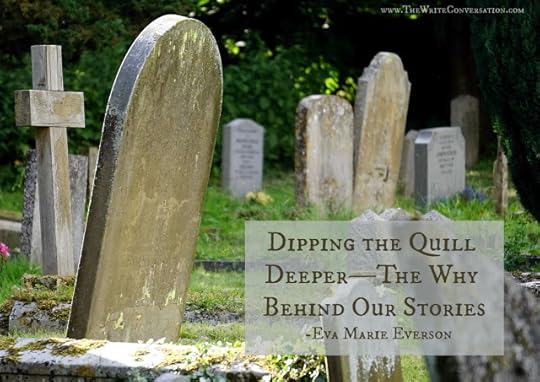
by Eva Marie Everson @EvaMarieEverson
Not to be Gloomy Gloria or Maudlin Mavis, but have you ever walked through a graveyard—especially the older ones, stones tilted by time, names and dates marred by the elements—and stopped long enough to read what some of the headstones reveal?Years ago, while enjoying some time in Cedar Key, Florida, I took a boat ride over to Atsena Otie Key, the original Cedar Key. After docking, we walked along a trail, under Live Oak archways dripping with Spanish moss, between the cedars (Atsena Otie means Cedar Island), and past the remains of the old Faber Pencil Factory destroyed by a tidal wave in 1896. Finally, we came to an old graveyard, cornered off from the rest of the world by nature’s calls and whispers and a silence that cannot be described.
As I walked along the markers, I noted that these headstones did more than just tell the date of the person’s birth and death; these markers revealed something about the departed whose bones lay beneath my feet. One such marker read: The chain has been broken and showed a woman’s hand holding a chain that had come apart, the last half of it falling to the earth. The heartache of those words rattled me. They still rattle me.
This experience, then coupled with having to determine what to place on my father’s headstone, left me to wonder about what would be placed on my own. Initially, I thought I would have something creative carved within the granite, such as: She wrote some books.
But, over time, I realized that, at the opening of nearly every keynote I have given, I begin with these words: I want to tell you a story … because that is what I’m about to do.
As writers—no matter our genre—we are telling a story. (Or, if you are a fiction writer, you are showing a story!)
Something inside us has begun the process of weaving this story together. It has a point. A purpose. A direction we must follow if we are to tell the story adequately. This requires us, of course, to know the story. To understand it and, perhaps most importantly, to know why we are telling it. To see ahead to where its path leads and to determine the stops along the way.
Not every story needs to be told. But those that rise up within us, that call to us—those stories that keep us awake at night and buzz through our thoughts during the day—these are the stories we need to tell. Before we do, we must lay the story out. Ask ourselves why we are telling it. What is the point we hope to make? Again, this can be fiction or nonfiction and is true for books or articles, the words we write for adults and those we write for children.
Remember, your legacy will fall within that story. Those words. That point and purpose. Should, a hundred or more years from now, someone walk along a sandy path beneath the eagle’s cry and the rush of palm fronds in a tropical breeze and happen up on your headstone, what might they read upon the stone that tells the story of your life? Will you have merely written some books? Or will you have told a story?
TWEETABLEDipping the Quill Deeper—The Why Behind Our Stories - @EvaMarieEverson on @EdieMelson (Click to Tweet)
 Eva Marie Everson is the multiple award-winning and bestselling author of over 35 books, both fiction and nonfiction. She is the president of Word Weavers International and the director of Florida Christian Writers Conference and North Georgia Christian Writers Conference. Eva Marie and her husband make their home in Central Florida where they enjoy a lake view, their children, and grandchildren. They are owned by a very small dog.
Eva Marie Everson is the multiple award-winning and bestselling author of over 35 books, both fiction and nonfiction. She is the president of Word Weavers International and the director of Florida Christian Writers Conference and North Georgia Christian Writers Conference. Eva Marie and her husband make their home in Central Florida where they enjoy a lake view, their children, and grandchildren. They are owned by a very small dog.



